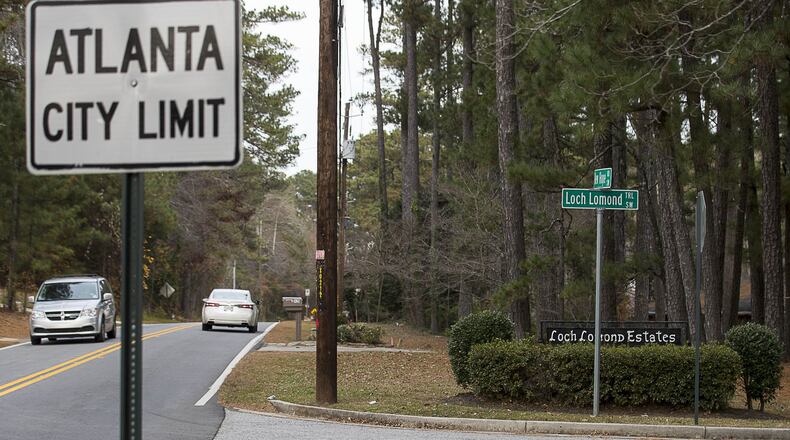Nearly three years after Georgia’s Court of Appeals ruled that Atlanta’s annexation of the south Fulton County neighborhood Loch Lomond was illegal, the city is finally letting go.
Since that October 2018 decision, Atlanta has continued to answer 911 calls and pick up garbage in the neighborhood, which is part of the city of South Fulton. That’s despite a cease-and-desist letter South Fulton sent Atlanta in 2019, imploring them to leave Loch Lomond residents alone.
Not until this summer did Atlanta transfer dispatch services and stop answering 911 calls for the subdivision. At the end of this month, it will stop picking up the trash. A transition date for street maintenance work is still being negotiated.
The change of heart comes months after the state Court of Appeals again knocked down residents’ attempts to become part of Atlanta. The March ruling, attorney Robbie Ashe said, meant their appeals had run their course.
“We managed to keep them out of the city of South Fulton for a shockingly long period of time, but not as long as we wanted,” Ashe said.
South Fulton is hosting a July 28 town hall meeting for Loch Lomond residents, but they’ve been voting and paying taxes in that city — not Atlanta — for years.
It’s frustrating for Jewel Johnson, a resident whose lawsuit led to the annexation being overturned. She said by continuing to answer 911 calls and pick up the trash, Atlanta gave false hope to some residents in the tree-lined community of about 200 homes.
“Atlanta had no business out here doing nothing,” she said. “The courts said Atlanta broke the law.”
Johnson, who is running for mayor of South Fulton, said residents have been caught between Atlanta’s bullying and South Fulton’s cowardice.
“I really do believe a lot of people want to move on. We haven’t been able to move on,” she said. “The reason this subdivision is divided is because we never got a chance to work with each other and heal.”
Loch Lomond, which has about 700 residents, is located in the southwest part of Fulton County, between I-285 and Camp Creek Parkway. Its problems began in 2014, when a group of neighborhood residents circulated a petition to annex the unincorporated area into Atlanta, just one street over.
The Atlanta annexation went into effect July 1, 2016, the same day the boundaries were set for the proposed new city of South Fulton. Some residents who favored South Fulton and had hoped to vote in favor of the new city’s formation immediately balked at the annexation, saying the petition was not done properly. They successfully sued and the neighborhood, which had been briefly in Atlanta, was out.
But a number of residents didn’t want to be in the city of South Fulton, which was approved by voters in November 2016 and formed in 2017. One of them was Mary Harris, a resident who said she was “very disappointed” by the end of her appeals.
“We followed the rules and the rules got changed,” she said. “The neighborhood is not happy. ... We have no way out.”
Harris disputed that the legal battle split the neighborhood, but other residents said there have been ongoing tensions for several years.
“It does not feel like one neighborhood,” said Reshard Snellings, who became a resident there in 2016. “It definitely feels divided.”
Snellings, who would prefer to be in Atlanta, said South Fulton has been “a nightmare to deal with.” The new city, he said, has not resulted in promised improvements to the area. Instead of better services, he said residents are seeing the city council approve industrial warehouses and fast food restaurants.
“We’re still happy, we’re still neighborly, we’re still a community, but we do not want to be in the city of South Fulton,” said Allen Johnston, a resident of 12 years, who added that some families who wanted to live in the new city “iced the rest of us out as turncoats.”
Johnston said he and other neighbors still hope something will happen that will let them stay in Atlanta. The ongoing legal battle, he said, “does not endear me to the city of South Fulton,” though that city was not a party to the disputes.
Etta Pittman, another resident who prefers Atlanta, complained about a 20-minute wait for an ambulance when she called 911 last year. The long response time was a result of confusion regarding the city lines. She’s lived in Loch Lomond for 23 years and said she’s “pissed” to be a South Fulton resident now.
“It’s over, it’s done, we understand that,” she said. “Our voices were not heard.”
Atlanta in a statement said that city has been cooperating with South Fulton to transfer city services. South Fulton spokesperson Gary Leftwich said the two cities are working together to make the change a smooth one. He said Loch Lomond residents “have been our friends and neighbors for years.”
“With an established community like Loch Lomond, you’re going to have deep feelings,” he said. “Hopefully we’re now able to assuage some of those feelings and let folks know the city of South Fulton is here to do the best we can.”
At the planned town hall, Leftwich said residents will have a chance to meet city leaders and ask questions. He asked for patience and cooperation through the transition.
Leroi Stanley, who wants to be in South Fulton, said he hasn’t been thrilled with everything the new city has done. But he welcomes the end of the dispute and said he hopes neighbors will again begin waving to each other and talking across loyalties.
“It’s still rocky,” he said. “I hope we can move forward together.”
About the Author
The Latest
Featured



